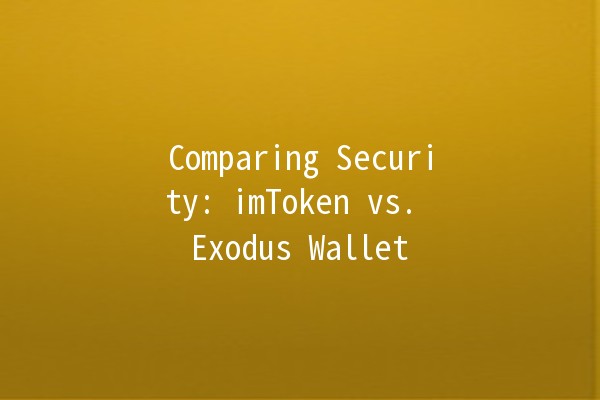In the rapidly evolving world of cryptocurrency, the security of digital wallets has become paramount for users. Both imToken and Exodus have gained popularity among crypto enthusiasts, yet they differ in several key aspects. This article aims to highlight the security features of each wallet, providing an indepth comparison that assists users in making informed decisions.
Hot Wallets: These are connected to the internet, making them convenient for frequent transactions. However, their constant connection to the internet can make them vulnerable to cyber threats. imToken operates primarily as a hot wallet.
Cold Wallets: These wallets are offline and are generally more secure against hacking threats. Exodus is accessible offline to a certain extent, which can enhance its security profile.

Both wallets allow users to maintain control over their private keys, but the way they manage this can impact security. imToken provides users with private keys stored on their devices, whereas Exodus implements a more seamless control system that integrates key recovery options.
imToken supports multisignature transactions, adding an extra layer of security. This means that multiple users must approve a transaction before it can be executed, significantly reducing the risk of unauthorized access.
A business using imToken can set up multisignature wallets so that any fund transfer must be approved by multiple partners. This reduces the risk of fraud.
User keys are stored locally and encrypted. This means that even if a hacker gains access to the mobile device, they cannot easily extract the private keys without the necessary credentials.
A user’s imToken account remains secure even if the device is compromised, as the encryption acts as a protective barrier against key theft.
imToken offers an optional 2FA feature that requires a second form of identification when logging in or making transactions, bolstering account security.
A user receives a verification code via SMS that they must enter to complete a withdrawal. This step minimizes the chances of unauthorized transaction attempts.
Exodus employs clientside encryption, meaning users retain control over their keys and data. The wallet never shares the user's private keys with external servers, significantly reducing potential breaches.
If Exodus's server faces an attack, the attackers cannot access user keys since the private keys remain on the user's device.
Exodus provides straightforward backup recovery options. Users can easily create backup phrases that allow them to restore their wallets in case of device loss.
A user can safely write down their backup phrase and store it in a secure location. If their device is lost or damaged, they can restore their wallet using the backup phrase.
Exodus frequently updates its software to protect against newly discovered vulnerabilities. Regular updates ensure that users benefit from the latest security features and improvements.
After a significant security vulnerability is reported, Exodus quickly rolls out an update that patches the issue, protecting its users from potential exploits.
| Feature | imToken | Exodus |
||||
| Wallet Type | Primarily hot wallet with offline attributes | Hot wallet with partially offline capabilities |
| Private Key Control | Users have direct control, keys stored locally | Keys encrypted on the device, not shared online |
| Multisignature Support | Yes | No |
| TwoFactor Authentication | Available | No |
| Backup Recovery | Usermanaged via phrases | Userfriendly backup recovery options |
| Regular Updates | Active updates to address vulnerabilities | Frequent updates enhancing security |
The safety of either wallet depends largely on user habits and specific features. imToken has robust multisignature support and optional 2FA, making it very secure. Conversely, Exodus has strong clientside encryption and an easytouse backup system. Ultimately, it’s essential to choose a wallet that fits your security needs and usage style.
Yes! Many users choose to diversify their holdings by using multiple wallets. You might use imToken for daytoday transactions and Exodus for longerterm storage. This strategy can enhance security and manage risks.
Both wallets provide recovery options. If you have your backup phrase, you can restore access through either wallet. Always keep your backup phrases stored securely to avoid losing access.
Both wallets allow users to set various transaction sizes, but limits may vary based on the blockchain network and wallet settings. Check the app for specific details.
Both wallets offer support through their respective websites. Ensure you only reach out through official channels to avoid phishing scams.
Both wallets have userfriendly interfaces, but you may find Exodus slightly easier for beginners due to its intuitive design and straightforward backup options. imToken offers robust features that might appeal to more advanced users.
, both imToken and Exodus provide solid security features, but they cater to different types of users with varying preferences for convenience and security. Users should weigh their specific needs against the features and security of each wallet to determine which solution best fits their cryptocurrency management strategy. Implementing the tips provided will further enhance the security of your wallet, regardless of the option chosen.